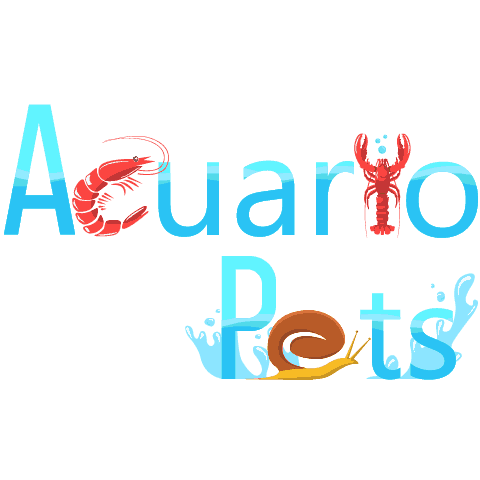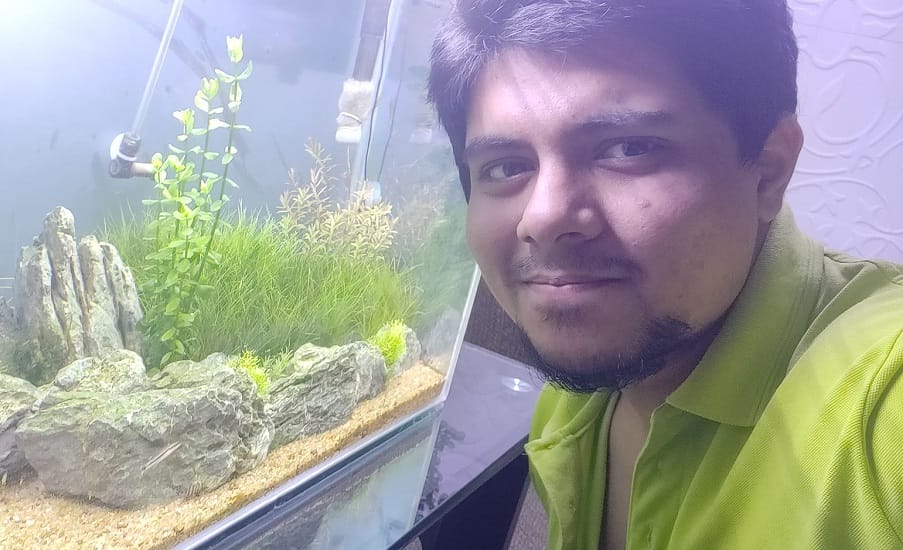This post was created with help from AI tools and carefully reviewed by a human (Muntaseer Rahman) . For more on how we use AI on this site, check out our Editorial Policy.
Check Out These FREE Tools We Made JUST For You!
Why a Weekly Fasting Day Helps Your Betta’s Digestion

Picture this: You’re standing in front of your betta tank at dinner time, pellets in hand, when your fish gives you those hungry, pleading eyes. But wait—it’s Sunday, your designated fasting day.
Sound familiar? If you’re wondering whether skipping feeding for one day is actually helping your betta or just making you feel guilty, you’re not alone.
The Truth About Your Betta’s Tiny Stomach
Here’s something that’ll blow your mind: your betta’s stomach is only about the size of their eyeball.
No, seriously. Take a look at your fish right now and imagine cramming a day’s worth of food into that tiny space. Suddenly, those 4-6 pellets seem like a feast, right?
This isn’t some random fish fact—it’s the key to understanding why fasting works so well for bettas.
What Happens During a Fast Day
Your Betta’s Digestive System Gets a Break
Think of fasting like giving your betta’s digestive system a spa day.
During normal feeding, bettas take about 6 hours to digest their food, and a weekly fast gives their digestive system time to rest and clear out any remaining food particles. This is especially important because man-made pellets contain ingredients like wheat that aren’t natural to their diet.
It’s like when you skip a meal after a big holiday dinner—sometimes your body just needs time to catch up.
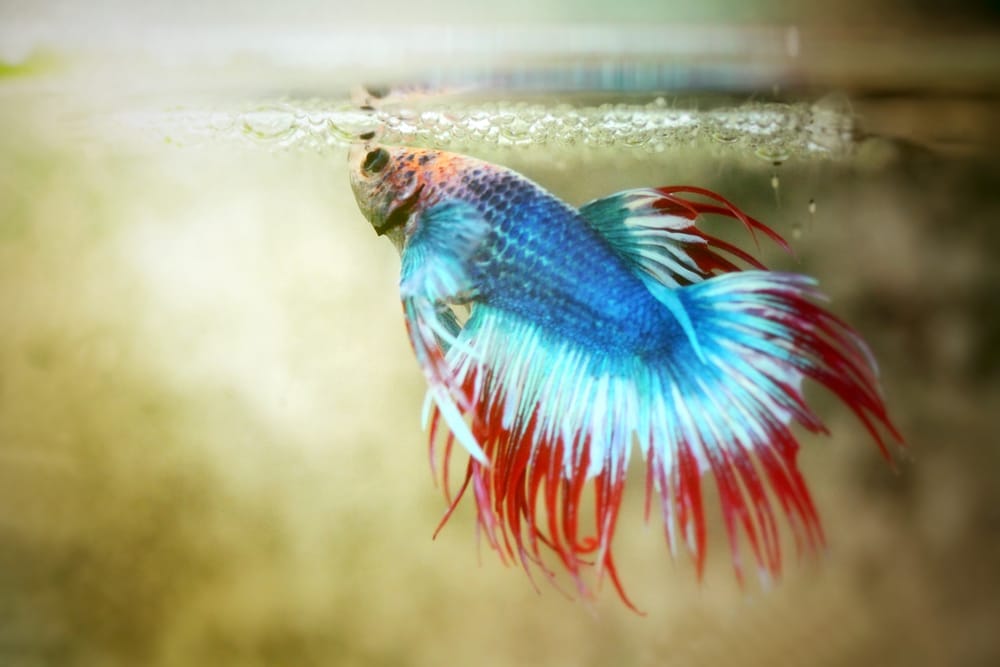
Prevention of Bloating and Constipation
Here’s where things get real: fasting once every 7-10 days helps prevent constipation and bloating, which are common issues in bettas.
Remember that eyeball-sized stomach? When it’s constantly working to process food, especially dry pellets that expand in water, things can get backed up pretty quickly.
The “Clearing Out” Effect
Fasting clears out their gut so they don’t have rotting food sitting there. Yeah, that’s as gross as it sounds, but it’s exactly why this practice matters.
What the Betta Community Actually Does
I dove deep into forums where actual betta owners share their experiences, and here’s what I found:
The Sunday Fasters
Many experienced betta keepers fast their fish on Sundays, feeding 6 days a week with one fasting day. It’s become almost a ritual—like a weekly reset button for their fish’s digestive system.
The “Oops, I Forgot” Group
Plot twist: Some owners accidentally create fasting days by forgetting to feed their bettas, and they report no negative effects. Their fish are perfectly fine, which tells us something important about how resilient these little guys are.
The Flexible Approach
Some betta keepers fast every 1-2 weeks rather than strictly weekly, adjusting based on their fish’s individual needs and behavior.
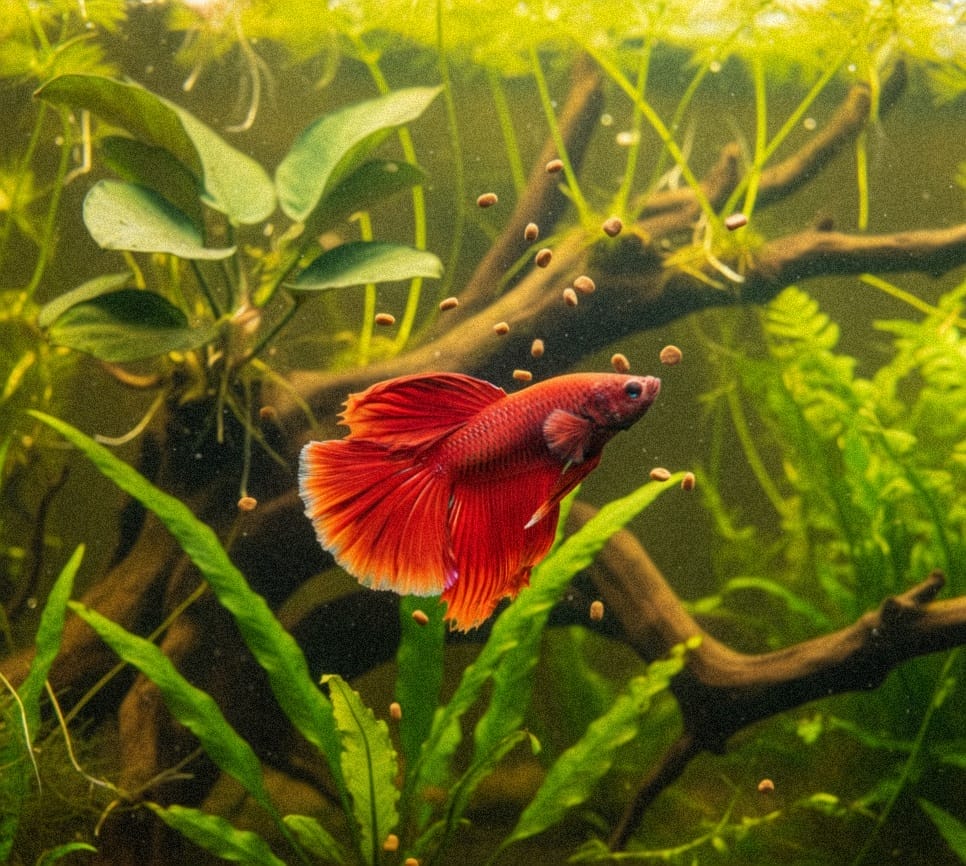
The Science Behind Pellet Digestion
Here’s something most people don’t think about: commercial pellets are high in protein and tend to expand in the stomach unless you soak them first.
Imagine eating a bunch of those expanding sponge toys. That’s basically what’s happening in your betta’s tiny stomach when they eat dry pellets.
The “unnatural” ingredients in commercial foods, especially wheat-based fillers, don’t break down as easily as live food would. A fasting day gives their system time to process these harder-to-digest ingredients.
How Long Can Bettas Actually Go Without Food?
Before you worry about your fish starving, here’s a reality check: bettas can survive 10-14 days without food, and most fish can go a week or more without eating.
One experienced fish keeper mentioned regularly being away for 2-4 days without feeding and seeing no adverse effects. These fish are tougher than we give them credit for.
Signs Your Betta Might Need More Frequent Fasting
Watch out for these red flags:
The Bloated Belly
If your betta looks like a tiny balloon after eating, that’s your cue to incorporate more fasting days.
Stringy White Poop
Stringy feces hanging from the anus is a sign of constipation and overfeeding. Gross but important to notice.
Lethargy After Eating
A healthy betta should remain active after meals. If yours is sluggish, they might be overfed.
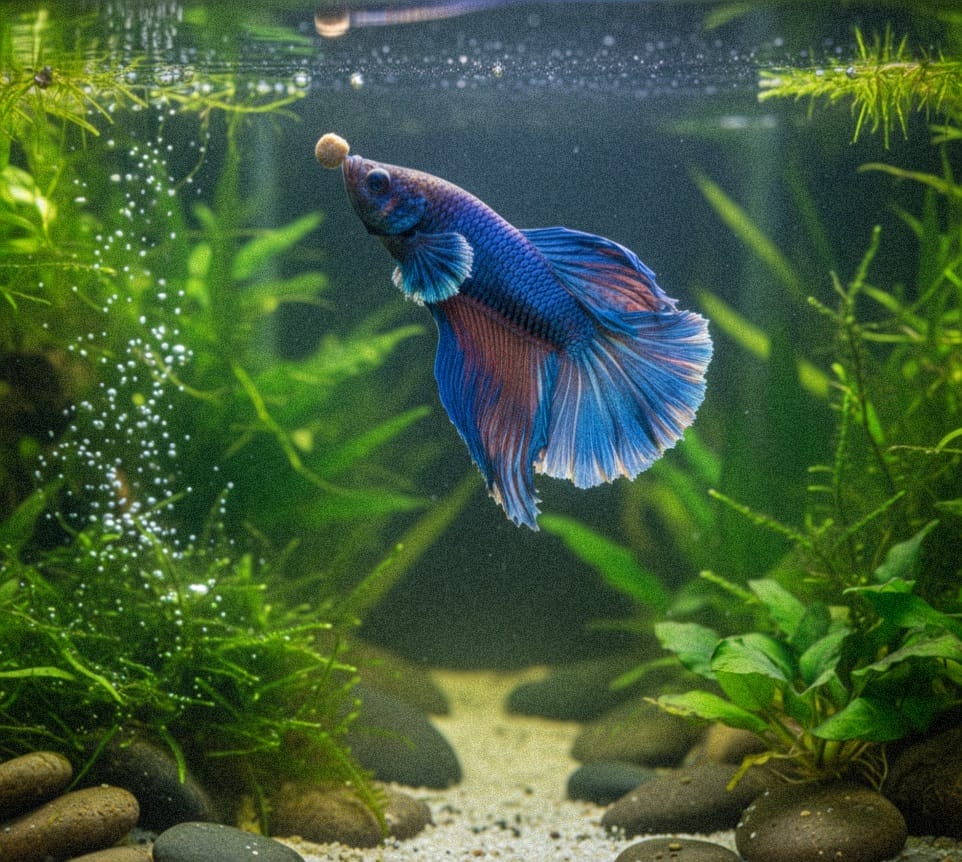
The Controversy: Do Bettas Actually NEED to Fast?
Not everyone agrees on fasting. Some experts argue that if you’re feeding proper amounts, fasting isn’t necessary.
There’s even one expert who believes fasting can be harmful, especially if a fish becomes ill, as it extends their recovery time. However, this seems to be a minority opinion in the community.
The middle ground? Fasting becomes more important for bettas prone to bloating, especially certain varieties like crowntails.
How to Implement Fasting Day Successfully
Choose Your Day
Pick a consistent day—many choose Sunday or Friday. Some people pick Friday because they’re “exhausted at the end of the week” (honestly, relatable).
Don’t Panic About the Begging
Your betta will absolutely give you those sad, hungry eyes. Some owners admit they’re “suckers for those sad faces” and struggle with consistency. Stay strong!
Consider a Pre-Fast Treat
Some betta keepers feed a half of a parboiled pea the day before fasting to help clear out their system. Others use frozen daphnia, which acts as a natural digestive aid.
Modified Fasting
If you can’t handle a full fast, try feeding just 2 pellets instead of your usual 4-5. It’s better than nothing!
Special Considerations
Active Bettas
Some very active bettas don’t respond well to fasting and may become lethargic or even aggressive. Know your fish’s personality.
Temperature Matters
If your tank isn’t properly heated (below 78°F), you might want to fast more frequently since cooler water slows their metabolism.
Breeding Bettas
Breeding fish have different nutritional needs and shouldn’t follow regular fasting schedules.

The Bottom Line
Fasting your betta once a week isn’t just some trendy fish-keeping fad—it’s a practical approach to preventing digestive issues in fish with tiny stomachs and big appetites.
The science is pretty clear: weekly fasting helps prevent constipation, reduces bloating risk, and gives their digestive system time to fully process artificial foods.
Will your betta die without fasting days? Probably not. Will they be healthier and more comfortable with them? The evidence strongly suggests yes.
So next time your betta gives you those pleading eyes on fasting day, remember: you’re not being mean—you’re being a responsible fish parent who understands that sometimes the best thing you can do is nothing at all.
Ready to try it? Pick your fasting day, mark it on your calendar, and prepare for some seriously judgmental fish stares. Your betta’s digestive system will thank you, even if they don’t.
About Author
Hello, I’m Muntaseer Rahman, the owner of AcuarioPets.com. I’m passionate about aquarium pets like shrimps, snails, crabs, and crayfish. I’ve created this website to share my expertise and help you provide better care for these amazing pets.
Disclaimer
This site is owned and operated by Muntaseer Rahman. AcuarioPets.com is a participant in the Amazon Services LLC Associates Program, an affiliate advertising program designed to provide a means for sites to earn advertising fees by advertising and linking to Amazon.com. This site also participates in other affiliate programs and is compensated for referring traffic and business to these companies.
